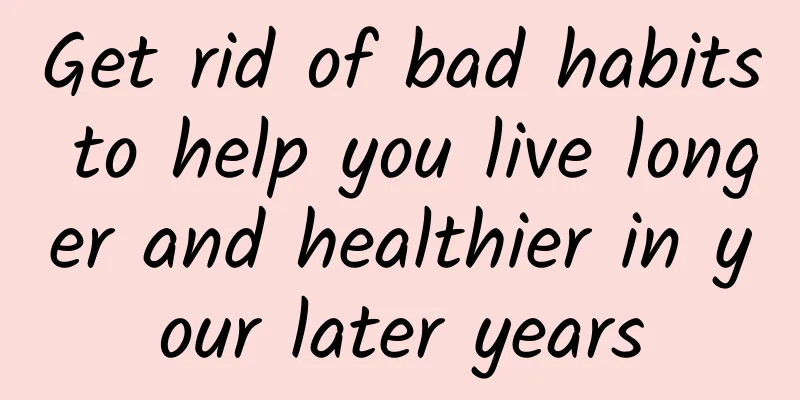Get rid of bad habits to help you live longer and healthier in your later years

|
Eating, drinking, and sleeping are three common things in life, but if you don't do these three things well, it will affect your health in your later years. As we age, our body functions gradually deteriorate. If we want to have a healthier life in our later years, we must change some bad habits in eating, drinking, and sleeping. | Several bad habits about eating 1. Eating fast Eating too fast can cause the following hazards: (1) Indigestion, which is mainly caused by eating too fast, which makes the digestive juices in the stomach unable to be secreted in time, causing food to accumulate in the stomach, resulting in indigestion. (2) Increased incidence of chronic diseases. Eating too fast can easily increase the rate of blood sugar rise in the body, which can easily lead to diabetes. (3) It can easily lead to obesity. Eating too fast can easily lead to overeating, especially watching TV, talking, or playing with mobile phones while eating, which can lead to unconsciously eating too much and causing obesity. (4) Intestinal diseases. Eating too fast will increase the burden on the gastrointestinal tract and cause gastrointestinal dysfunction. 2. Love to eat strong flavors Salted fish, bacon, kimchi... high-salt diet is closely related to the occurrence of gastric cancer. The National Health Commission once issued the "Ten Core Information on Salt Reduction for Chinese Residents", pointing out that a high-salt (sodium) diet can lead to a variety of diseases such as hypertension, stroke, gastric cancer, and osteoporosis. About 50% of hypertension and 33% of stroke are caused by a high-salt diet. The World Health Organization stipulates that the daily salt intake per person is 5 grams. Exceeding this amount, the hyperosmotic fluid in the salt will damage the gastric mucosa. In the long run, it is easy to induce gastric cancer. 3. Habit of eating hot food Frequent consumption of hot food can easily cause the following hazards: (1) Damage to the oral mucosa: The mucosa in this area is usually fragile. If overly hot food directly stimulates the oral mucosa, it can cause congestion and form blisters, hematomas, and ulcers. Frequent consumption of overly hot food may also increase the risk of oral cancer. (2) Damage to the upper gastrointestinal mucosa: The upper gastrointestinal tract is mainly composed of mucosal tissue. Frequent consumption of hot food may also cause damage to the upper gastrointestinal mucosa. In severe cases, local ulcers, edema, mucosal atrophy, etc. may form. In addition, it may also increase the risk of gastrointestinal diseases such as esophagitis, gastritis, gastric ulcers, gastric bleeding, and even esophageal cancer. 4. Overeating at every meal Long-term overeating is harmful, and the main symptoms are nausea, vomiting, abdominal distension, diarrhea, loss of appetite, drowsiness, obesity, high blood sugar, high blood lipids, high uric acid and other symptoms. In particular, excessive consumption of fried foods, desserts, greasy foods, etc. can cause nausea, vomiting, abdominal distension, loss of appetite, and even diarrhea and other digestive system symptoms. At the same time, due to overeating, blood is concentrated in the digestive system, and the brain is not supplied with enough blood, which will cause symptoms of lack of energy and drowsiness. If you eat too much for a long time and do not exercise enough, it will also lead to glucose and lipid metabolism disorders, impaired glucose tolerance, insulin resistance, hyperlipidemia, hyperuricemia and other metabolic diseases. | Several bad habits about "drinking" 1. Don’t like to drink water There are many dangers of not liking to drink water, including the following aspects: (1) Upper respiratory tract infection: When the body lacks body fluid, opportunistic pathogens in the throat or foreign bacteria and viruses can cause the upper respiratory tract to be infected first; (2) Urinary tract stones: If you don’t like to drink water, your urine volume will be less, the excretion of toxins will be reduced, and the urine will concentrate and crystallize, which is easy to form stones; (3) Constipation: Due to the lack of water in the intestines, the stool becomes dry and difficult to defecate, which is easy to form constipation; (4) Cardiovascular and cerebrovascular diseases: The blood is viscous and it is easy to form thrombotic diseases, such as cerebral infarction, myocardial infarction, etc. 2. Drinks instead of water Beverages cannot replace water. This is mainly because beverages contain not only a large amount of water, but also a lot of sugar, pigments, preservatives, salt, etc. Drinking too much is very harmful to your health, especially drinking carbonated beverages frequently, which can also cause osteoporosis. Therefore, it is recommended to drink more water as much as possible in daily life. The soup that has been stewed for a long time has very high purine and fat content. Patients with "three highs" should try to drink less. While dissolving the amino acids and soluble vitamins in the ingredients in the soup, fat, cholesterol and purine will also be dissolved. Many people think that fish, meat, offal and other ingredients have high purine content, so they don't eat meat and only drink soup. But they don't know that purine is actually dissolved in the soup. Especially the "old fire soup" that has been stewed for a long time has a higher purine content. If you drink such soup for a long time and in large quantities, it is easy to cause high uric acid and even gout. | Several bad habits about "sleeping" 1. Habitually staying up late Among bad sleeping habits, the most dangerous one is staying up late. It is best to fall asleep before 11pm. When staying up late, people are in a state of stress for a long time, and constantly secrete hormones such as adrenaline, which will cause abnormal vasoconstriction. Long-term lack of sleep will make people feel nervous and anxious, which can easily induce or aggravate high blood pressure. For patients with atrial fibrillation, arrhythmia, coronary heart disease, etc., staying up late will invisibly increase the burden on the heart, and it is easy to cause myocardial infarction. 2. Drinking alcohol can help you sleep Although drinking a small amount of alcohol before bed can make people fall asleep faster, this sleep state stays in shallow sleep and it is not easy to enter deep sleep. Therefore, even if you sleep for a long time after drinking, you still feel tired and weak when you wake up. It is not recommended to drink before going to bed. Long-term drinking or excessive drinking not only cannot promote sleep, but can even cause central nervous excitement, leading to insomnia. Even if drinking can have a short-term hypnotic effect, it will bring more serious insomnia problems later. Therefore, try not to drink 4 to 6 hours before going to bed. If you have insomnia, you can alleviate insomnia by improving your behavior. Drinking a glass of milk or soaking your feet in warm water before going to bed, listening to music or white noise are all good ways to promote sleep. 3. Playing with your phone before going to bed There are many harmful effects of using a mobile phone before going to bed: (1) Staring at the mobile phone screen for a long time before going to bed can easily cause dry eyes and tears. Looking at the mobile phone screen at a close distance can cause myopia to deepen. Before going to bed, you should fully relax your eye muscles to avoid visual fatigue. (2) Playing with a mobile phone before going to bed can cause cervical spondylosis, which can cause the physiological curvature of the cervical spine to bend and deform, the ligaments of the neck to be stretched, and the intervertebral disc and intervertebral foramen to be compressed, leading to cervical spondylosis. (3) It can lead to poor sleep quality. Brain cells should not be overexcited before going to bed, so they should be fully relaxed. (4) Mobile phone radiation can cause pigmentation. Turning off the lights before going to bed will further aggravate cell pigmentation, which is very bad for the skin. 4. Eat a midnight snack before bed It is not good to eat supper before going to bed. Eating supper before going to bed will cause excessive energy intake, and less activity during sleep will cause excessive energy to be stored in the form of fat, leading to a high incidence of overweight and obesity. In addition, eating supper before going to bed will affect sleep. It will cause too much blood to accumulate in the gastrointestinal tract, resulting in reduced blood supply to the brain, making sleep prone to dreaminess and poor quality. If you are really hungry, you can choose some easy-to-digest and light food, and avoid consuming caffeine, spicy food or greasy food, which will cause gastrointestinal disorders and even affect your spirit the next day. (Picture from the Internet) |
<<: I bet you've never seen earwax picked like this
Recommend
One month pregnant belly swelling
There should be many women who have their own bea...
What it feels like to be nine months pregnant
When the pregnancy reaches the 9th month, it is a...
How to relieve eye fatigue from watching videos, watching TV series, and playing games every day?
《Cotton Swab Medical Science Popularization》 Depa...
How to treat chronic inflammation of the fallopian tube?
For many people who want to be mothers, especiall...
How to create a pregnancy record
Pregnancy should be said to be a happy thing for ...
What causes adnexitis?
Adnexitis is not unfamiliar. Adnexitis is a very ...
Is it normal to have one side of the vagina enlarged?
Although the female genitals are in a very privat...
What's wrong with low progesterone and abdominal pain but no bleeding?
Progesterone is clinically known as progesterone,...
Why does my back hurt after pregnancy?
A pregnancy lasts ten months, which can be said t...
What is the reason for early menstrual period? Ladies, please watch this.
Many women have the habit of having their menstru...
Are there genital warts in the vagina?
If I mention genital warts now, I believe many pe...
Do you know what common cervical diseases are there in women?
Cervical disease is caused by various lesions in ...
Brown discharge after period
Every woman has menstruation. It is a natural law...
Is pelvic fluid blood?
There are two types of pelvic effusion, one is pa...
14 weeks pregnant hard belly
At 14 weeks of pregnancy, the pregnant woman has ...









